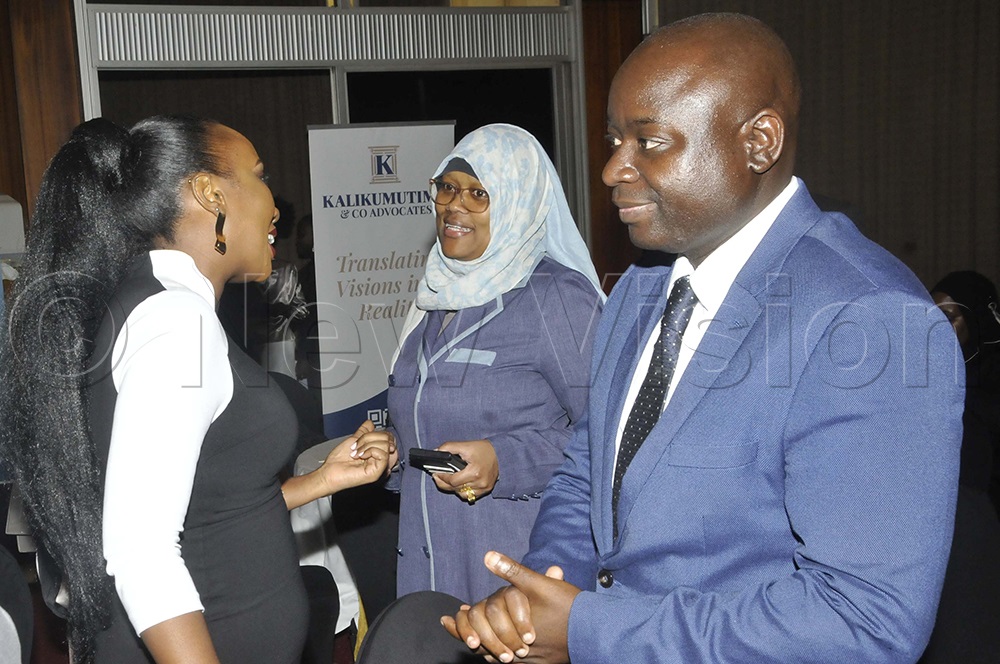Govt, businesses urged to embrace arbitration for faster conflict resolution
Legal luminaries highlighted arbitration’s edge in protecting corporate secrets, resolving conflicts swiftly, and aligning with global standards.
(L-R) Annita Nantale, lawyer of commercial law, Dr Suzan Nakanwagi Susan is a lawyer and currently a Natural Resources Governance and Rights Specialist at Regenerate Africa Uganda, Prof. Chrispus Nyombi, an expert on International law and John Ohaga, Managing Partner, TripleOKlaw Olaw Advocates at Serena Hotel in Kampala, September 9, 2025. (Photo by Wilfred Sanya)
_______________
As businesses and governments grapple with rising disputes, experts are rallying for a shift toward arbitration, which, according to them, is a faster, confidential alternative to court battles.
During a September 11, 2025, training organised by the National Union of Lawyers, Judicial Officers and Allied Workers (NULJAW) in Kampala city, legal luminaries highlighted arbitration’s edge in protecting corporate secrets, resolving conflicts swiftly, and aligning with global standards.
TripleOKlaw Olaw Advocates managing partner, John Ohaga, a seasoned Kenya-based arbitration specialist, warned of the pitfalls of litigation, saying, “In court, company secrets are exposed, and the process is slow. Competitors gain insight into your private matters. Arbitration ensures privacy and a win-win outcome in less time.”
Ohaga emphasised arbitration’s ability to shield sensitive details while fostering collaborative solutions. He also addressed climate change’s regulatory challenges:
“Governments often enact climate policies that indirectly expropriate investments by altering regulatory landscapes. Investors must anticipate such shifts and ensure contracts align with global norms.”
Ohaga stressed that tribunals must balance governments’ sovereign power with investor rights, applying a “proportional test” to assess regulatory fairness. He urged governments to draft treaties and contracts with clarity, aligning them with international agreements:
“Investors must do due diligence to foresee risks. Governments, too, must craft regulations that respect both public interest and long-term investments.”
Training the next generation
NULJAW general secretary, Peninah Tukamwesiga, urged lawyers to join the union for specialised arbitration training.
“You don’t need a law degree to be an arbitrator. We train members to master negotiation and long-term deal-making. Arbitration resolves issues faster because it’s about dialogue, not confrontation.”
Prof. Chrispus Nyombi, (right) an expert on International law (right) shares a moment with a lawyer during a training on arbitration organised by the National Union of Lawyers, Judicial Officers and Allied Workers (NULJAW) at Serena Hotel in Kampala, September 9, 2025. (Photo by Wilfred Sanya)
Technology’s role
Aisha Abdallah, the head of dispute resolution at ALN Kenya Anjarwalla and Khanna, championed digital tools.
“Virtual hearings protect witness privacy while storing evidence securely. This modern approach ensures fair, efficient justice, even across borders," she said.
From shielding trade secrets to navigating climate policies, arbitration emerges as a pragmatic tool for Uganda’s stakeholders. As Maria Birungi’s land rights case demonstrated earlier this year, timely, private resolution can transform lives—and businesses.